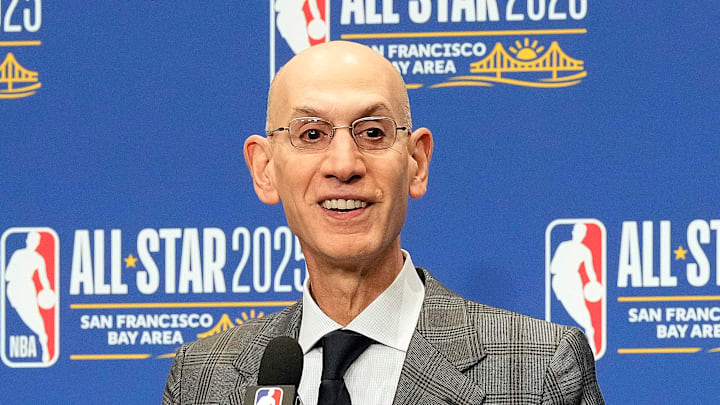For years, NBA fans have dreamed of expansion, but adding new teams is not nearly as popular an idea among the owners.
The two cities that have garnered the most attention in talks of expansion have been Las Vegas and bringing a team back to Seattle. Although it's enticing for fans and even owners to add teams to the league, the complexity of the situation can raise multiple issues.
For context, the NBA last expanded in 2004, when the league added a franchise in Charlotte, North Carolina, the then-Bobcats. In 2008, the Seattle SuperSonics moved to Oklahoma City, and both franchises have remained in their respective cities since.
Board of Governors meeting
On Tuesday, the NBA's board of governors held a meeting in Las Vegas to discuss the idea of expansion, and NBA Commissioner Adam Silver provided updates on how the league will continue to do research on the topic.
"A lot of analysis still needs to be done, and nothing's been predetermined one way or another, and without any specific timeline," Silver said. "We're going to be as thorough as possible and look at all the potential issues."
Although the league hasn't gotten any closer to rewarding expansion teams, Silver described the latest update as "a significant step."
"We're now engaging in this in-depth analysis, something we weren't prepared to do before," Silver said. "In terms of price, potential timeline...too early to say. And again, I think that also assumes the outcome of this analysis. It is truly a complicated issue."
Silver added: "I wish, standing here as the commissioner, I had lots of teams to dispense to many markets who are interested in NBA basketball. I just think we also have this greater obligation to expand, if we do so, in a very deliberate fashion, in a way that makes sense holistically for the league. That's really the best I can do."
The two biggest concerns for owners moving forward are how the new TV media deal will affect the current teams financially and how expansion team rosters might impact the quality of the game.
NBA media rights deal
Last summer, the NBA signed an 11-year, $76 billion agreement on a media rights deal that will start in the 2025-26 season and run through the 2035-36 season. This deal includes partners such as Comcast (NBC and Peacock), Amazon Prime, and Disney (ABC and ESPN).
The current owners are set to collect hundreds of millions of dollars over the next decade of this new rights deal. If ownership and the board of governors went through and added more teams, that would dilute a good portion of the money that would've been going directly to them.
Adam Silver also highlighted the uncertainty about the future of local TV deals for potential teams.
"We would be malpracticing if we didn't figure out how local regional television is going to work before expanding," Silver said. "The notion that we would hand over a team into a city where we're not currently operating and say, 'You're going to have to figure out how you're going to distribute your games to your local fans' doesn't make sense."
Competitive disadvantage
If the NBA implemented expansion teams, outside of just the business side of things, you realize that it may take years for those new franchises to become competitive.
You would have role players across 30 existing teams slowly pulled away from their current teams as they're entered into an expansion draft and free agency with the new franchises. Now you have a league with 36 more roster spots to be filled by players from the G League, international leagues, and beyond.
Now, you take it a step further and imagine the PA announcer calling out Miles McBride, Gradey Dick, Jaden Hardy, Jonathan Isaac, and Ryan Dunn on opening night as the starting five in an expansion city. It's no disrespect to those players, but it would likely take years for those new teams to develop and acquire talent to build a winning product.
The Ringer surveyed a dozen NBA figures, from scouts to team executives to owners, and found opinions across the spectrum regarding the topic of expansion. Multiple executives shared their reservations with statements such as, “Of course it’s going to be worse,” or “Maybe there’s an initial impact of talent dilution, [hopefully] within a few years, it stabilizes.”
While some executives have their reservations, former Mavericks owner Mark Cuban is all for the expansion of the league. “The talent levels are higher than they have ever been," Cuban said. "So I have no issues about dilution...I’m all for expansion.”
Adam Silver repeated the sentiment last June, saying: “It’s on the league to look holistically, because there is the dilution, of course. Let’s say we expand by two teams: What does that mean for talent? I feel great about where the talent is right now in the league, but those players have to come from somewhere...We want to make sure that if we expand, those teams can be equally competitive."
Although the general increase in basketball talent is indisputable, it’s the quality of that talent that some owners and executives view with skepticism, and rightfully so.
Expansion benefits
However, there are some incentives for current owners and teams to want to bring in new franchises. With the cost of current franchises continuing to rise, expansion fees are certainly going to go well beyond the previous projections of at least $5 billion per new franchise.
League insiders believe franchise fees for two new teams could generate as much as $12 billion, to be split by the current 30 owners. New markets could bring in hundreds of thousands of new fans, and more teams mean more jobs for players, coaches, scouts, and trainers.
Although there is no rush from the league office, Adam Silver and the owners collectively as a whole will continue to weigh all the options and see what is best moving forward for the league regarding potential league expansion.
